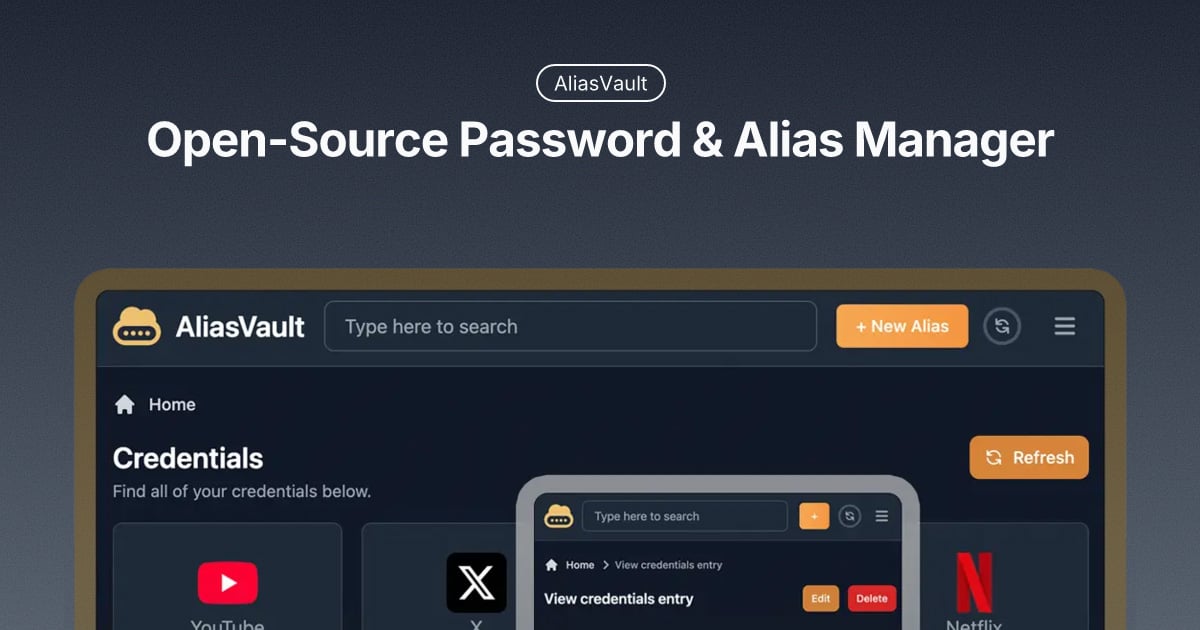Just discovered this cool project, thought i’d share it here.
AliasVault is an end-to-end encrypted password and alias manager that protects your privacy by creating alternative identities, passwords and email addresses for every website you use. Keeping your personal information private.
Link to website: https://www.aliasvault.net/
Link to source code (MIT Lisense): https://github.com/lanedirt/AliasVault
For those wondering how the alias feature works:
AliasVault includes a built-in email server that allows you to create unique email addresses (aliases) for different services. When someone sends an email to your alias, it’s received directly in AliasVault, helping you maintain privacy and reduce spam.



Ah, if all of your email aliases trace back to your personal, locally hosted server, of which you are the only user, on presumably your personally owned domain, it will not be private… well private in the sense that it’s just you I guess… but super duper identifiable - because it’s just you. At which point why bother with the aliases.
Because once some service “loses” (or sells) your email and you start getting spam, it’s pretty easy to burn that specific email address and change it to something else with that specific service and the spam will stop.
As someone that uses a custom domain for the majority of his email, it’s not really a privacy thing, it’s a control thing.
I have hundreds of unique unpredictable email addresses and I can disconnect them at will to stop spam.
Agreed, though i do think it’s a privacy thing. Many people use privacy and anonymity interchangeably but they are different things.
The options are:
I did the catchall for a few years but have been doing aliases for 5+ now. In the end, the only people/ companies who have my email are the ones I want.
A catch-all domain address with whois privacy and hosted elsewhere helps a lot.
Does it?
Do you think spammer will just stop at the first address and then call it a day?
In my experience there is no such thing as a “catch all” domain address. The second your domain leaks then many spammer will just go into a frenzy and try hundreds or thousands of mail aliases.
Especially since they can’t really spam Gmail as easily (since early 2024) they will even more aggressively spam any other domain.
spammers they just email info@domain and call it a day, they don’t try to see if you have some custom naming scheme. I bounce all emails sent to that, the rest is catchall, with occasional blacklist to some TLD like .monster .asia .xyz or .su
This is not at all my experience with custom mail domains.
And I say that after spending a lot of time setting SPF, DKIM and DMARC filtering.
I guess you got lucky.
Why should a scammer or spammer bother with a tech savy person. Scammers and spammers use E-Mail dumps from data leaks to spam and scam ppl. The first step is automated, way more profitable then to go spear fishing on a normal user.
I’m not sure why people are trying convince me to change my mind on something.
I have seen it in my logs with my own eyes. I wish I could be left alone without having to bother looking into it.
Whatever the reason is. Someone is crawling through dictionaries of address. It is slow but steady. It started with abuse@ and other generic addresses and then started trying names. I blocked the sending SMTP server once I realized what was going-on.
What am I suppose to do? Ignore it and just triage in inbox?
It is just not the way the usual scammer and spammers operate. Ofc there are other types of criminals that do operate differently but those do not get their Addresses from a data leak which E-Mail aliases pretect against
More than 2 years with my personal domain and I can’t remember a single spam email… But you do you.
yet
Again, you do you.